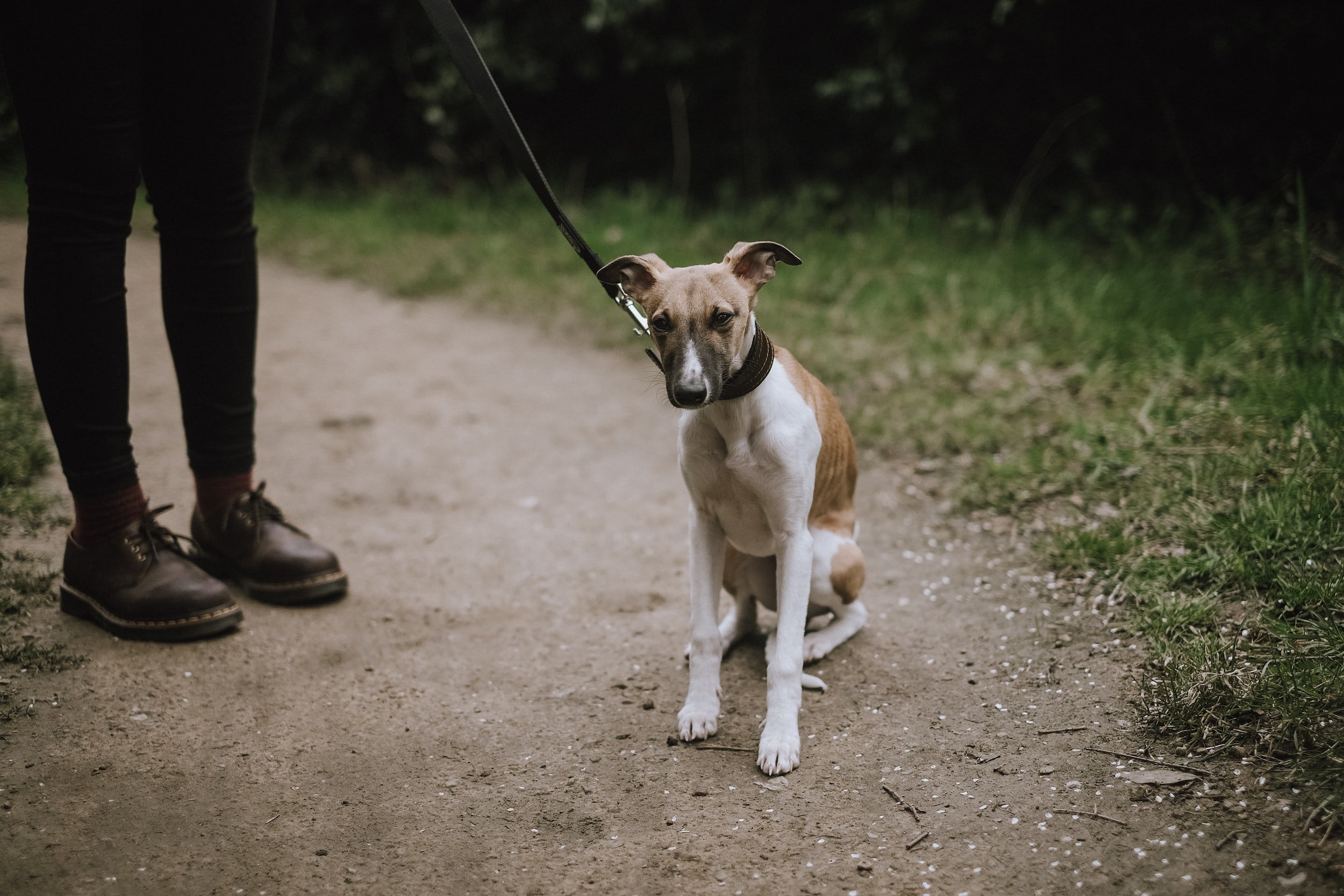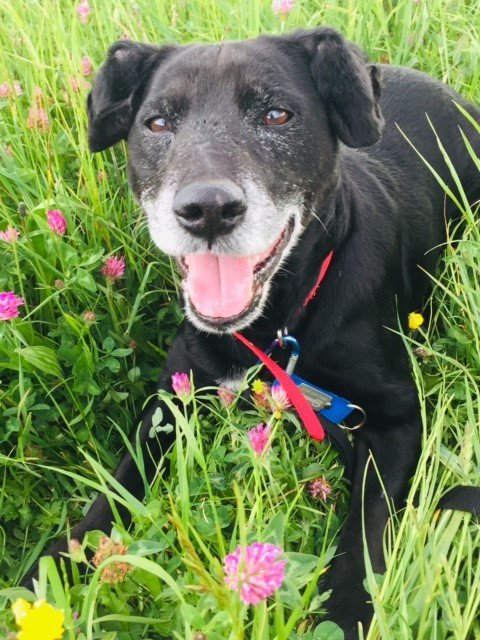The other end of the lead
It is not uncommon to see dogs out on their walk, struggling at the end of the lead, which is distressing for the dog and their guardian. However, pulling on the lead is not a dog problem, a lead means nothing to the dog until we teach them. Dogs don’t walk in straight lines, they meander or move from side to side, so teaching them to walk looking up at you adoringly for 30 minutes is unsustainable and also a travesty as they are missing out on so much other important stimulation.
Often teaching your dog the meaning of a lead doesn’t start at the end of the leash, it is about teaching your dog to engage slowly with the environment. The big wide world can be scary and over stimulating for some dogs, so they may rush through it as this brings some relief. Showing them how to slow down, use their nose and investigate the environment means you inadvertently have a dog who takes their time and stays close by, this is ultimately what most of us would like. This allows you to appreciate the time you spend walking together, rather than filling it with lead corrections which ultimately damage the guardian/dog relationship.
- Penny Ashby BSc(Hons) RVN DipCABT PgCert
The ‘Why’ and not the ‘How’
So often we want to treat the ‘bad’ behaviour, get rid of it as quick as possible, when actually we need to look at the needs of the animal first. If I am asked ‘how do I stop my dog barking?’, I am not looking at how I stop the bark, I will be delving deep into WHY does the dog bark.
“We have many powerful skill sets and tools to help us change unwanted behaviours but perhaps we should start by challenging the very premise that behaviour ‘needs’ to be changed, and think first about what needs need to be met? Not as part of a process of changing behaviour, because behaviour is information, but as part of a process of providing what’s needed (we don’t treat disease to change symptoms, we use symptom change to inform us about the success or not of treating disease).”- Kathy Murphy, Barking Brains.
Let them sniff
Dogs are amazing and in particular their noses. Blood Hounds have 300million nasal receptors, compared to a human who has 5 million. To put this in perspective a dog could detect a teaspoon of sugar in two Olympic sized swimming pools of water.
Think of sniffing like your dog reading a newspaper, or a magazine and catching up on the daily headlines. Picture now that it is you doing this and finding out what world news has occurred, or getting to the good bit of your favourite book and someone keeps turning the pages for you mid sentence! How would you feel? Probably quite frustrated I would imagine. This is why sniffing is so important for dogs, their noses are how they perceive the world, this is so perfectly explained by Alexandra Horowitz:
”Let them sniff. Perhaps because we as humans are so visually centred it’s hard for us to imagine what it might be like for our primary sensory ability to be olfaction. But that’s how it is for dogs: they sniff first, and ask their eyes to confirm or deny. Their world is made of scents more than sights. As a result, when they agreeably head out with you for a walk, the both of you are experiencing parallel universes: we see what’s on the street; the dog smells who’s’ passed by and who is upcoming (on the breeze). Since humans are generally averse to closely smelling things – in fact, we find the idea of ‘smelling’ one another funny or even rude- some owners discourage dogs from doing that- from sniffing one another or the traces other’s have left. But that is the dog’s whole world. I would no more pull my dog away from a street corner he is mightily investigating than I would force my son to stare at his knees as we drive by the Colosseum. Acknowledging the dog’s otherness- and in this case, their different way of perceiving the world you share- is a good step toward giving them the life they deserve”
(Alexandra Horowitz)
Let your dog’s nose guide your walks, take a moment, enjoy the pause, follow your dog not your own destination and see what wonderful journey they may take you on
- Penny Ashby BSc(Hons) RVN DipCABT PgCert
Warning about Puppy Vaccines
It can be common practice for breeders to give the first vaccine to pups prior to them going to their new homes. This can be an excellent principle as it allows for guardians to start their puppy’s socialisation and habituation as soon as possible. However, an issue can arise if the initial vaccine used is not the same as the vaccine your chosen vet may administer for the subsequent vaccines. If they differ, often the course will have to be started again which can delay socialisation by weeks and have a hugely detrimental impact on the puppies future.
This can be easily remedied though, double check if your breeder intends to vaccinate. If they do, simply call your vets and check which type of vaccine they use and that they are compatible. If they are not, you can ask your breeder not to vaccinate and start the course, from the beginning, with your vet directly.
-Penny Ashby BSc (Hons) RVN DipCABT PgCert
Why the rescue dog can be a better option than a puppy
It goes without saying the reasons for wanting a puppy, they are adorable and cute but in addition, people often want pups as they feel they can mould them to the way they want them to be, that this is a failsafe plan to creating the ‘perfect dog’. This to a certain extent is true, if much time and effort is applied but there are many other factors to take into account.
Genetics. You may or may not get the chance to meet the parents of your pup, sometimes just the mum, or a relative perhaps. This is key to knowing how your pup’s behaviour could be affected. If the pup’s parents have sensitivity issues related to people, or other dogs, this could be passed to the puppy. Without meeting the parents you may be unknowingly taking on these issues.
Breed tendencies. As dogs have evolved and been domesticated we have bred them with specific traits which may not fit your lifestyle.
Pups have a period of socialisation between 4-12 weeks which is an important time for their development. Equally, the whole first year is a sensitive period, the environment surrounding your pup, routine and exposure will all influence its behaviour. If your pup was to have a bad experience within their critical period, or sensitive period, where he/she was very frightened, this could create an immediate and lasting anxiety issue which you were not prepared for and may not know how to resolve without help.
Then of course there is the pooing, peeing, barking, biting, hyper-excitability and lack of sleep...... if you have kids this can be one step too far. Or, if you were not aware that this is part and parcel of being a puppy guardian, it can be a shock!
Everybody leads different lives, we all have different expectations about what we would like from our dogs and how we want them to behave. There is so much to know to be able to raise a puppy to be ‘how you would like it to be’, often this ideal is not achievable and you may be disappointed and very frustrated.
This is where the rescue dog comes in. Of course, one benefit is that you would be contributing to negating that rescue dog from becoming a potential statistic, one of the 1000’s of dogs euthanised each year but predominantly because you can very consciously try to a select a dog to fit your needs and lifestyle. If you want to run with your dog perhaps the Dachshund is not the dog for you..... but the rescue option allows you to have a think about what traits may best suit you; a calm dog, a bouncy dog, a lap dog, enjoys long walks, good with children, loves other dogs etc, etc. To realistically try to identify these certain traits I would suggest you look at dogs who have been in foster for 3 months or so, as it takes roughly this amount of time for them to settle and display their personality and individualities. A middle aged dog could already have a sufficiently moulded, mature, formulated character which you know to be suited to you. Any new dog will always need help, understanding and guidance but with a very careful and informed selection process you may be very nicely surprised by your newly adopted dog.
- Penny Ashby BSc (Hons) RVN DipCABT PgCert








